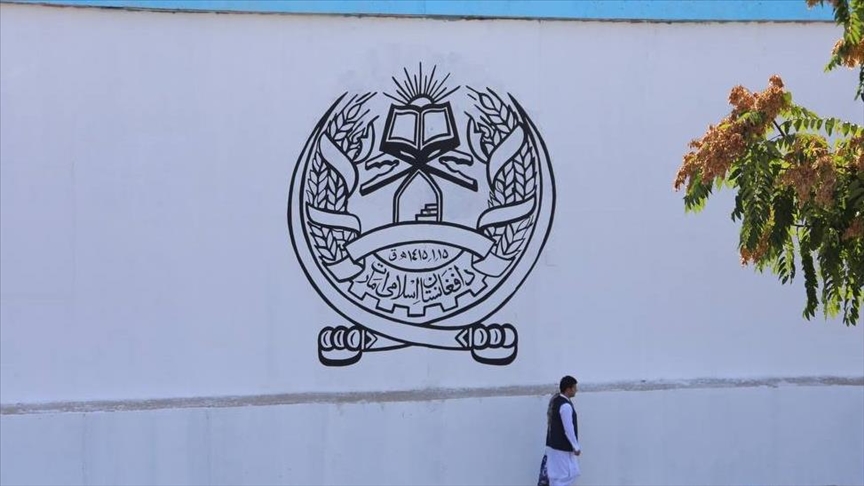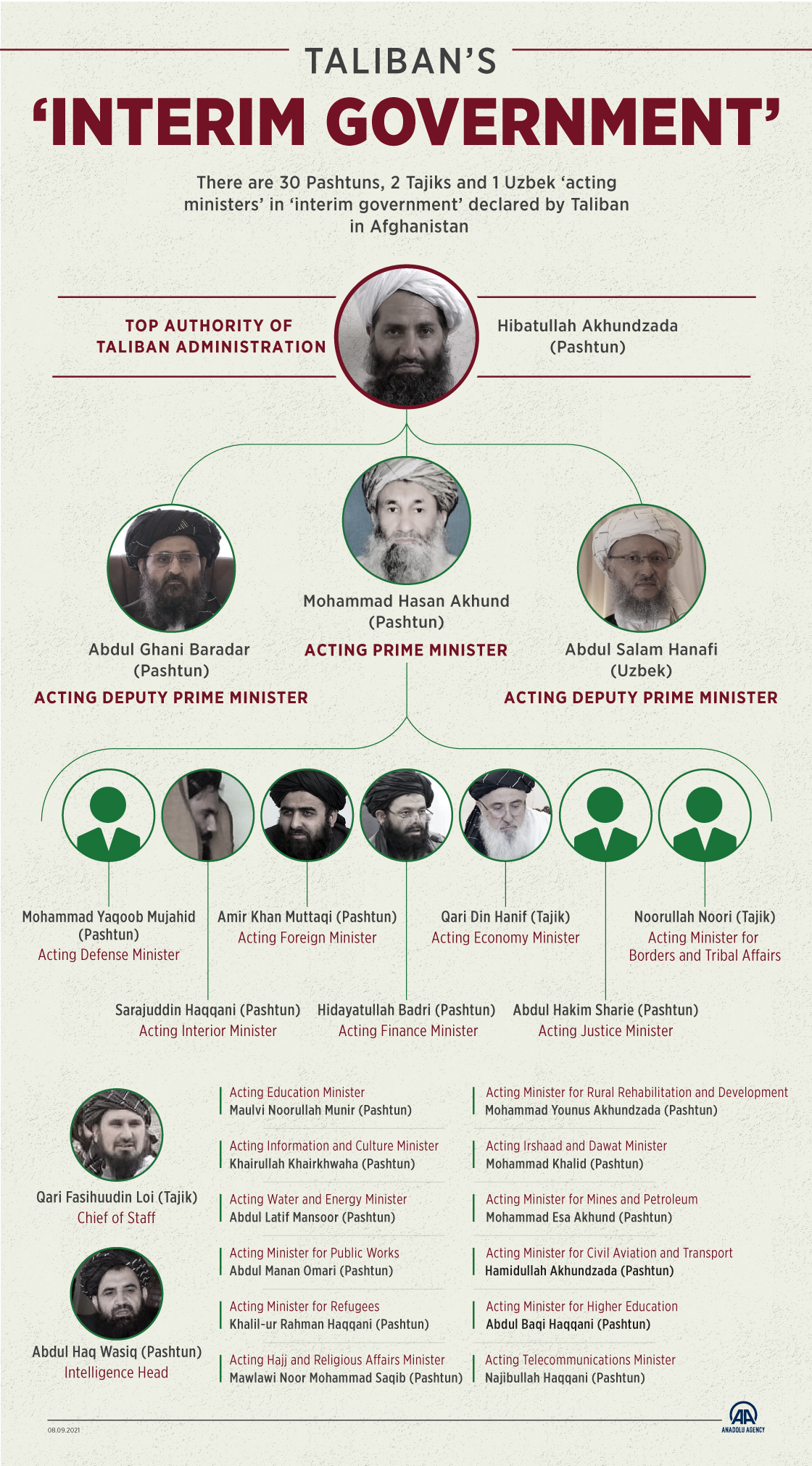Who's who in Taliban interim government?
In 33-member Afghan caretaker Cabinet, only handful of portfolios given to non-ethnic Pashtuns

KABUL, Afghanistan
The Taliban, or "students" in the Pashto tongue, first emerged in the early 1990s in northern Pakistan during the Mujahideen’s control of the Afghan capital Kabul after the 1989 withdrawal of Soviet troops from Afghanistan.
The US invasion of Afghanistan in the aftermath of the 9/11 terrorist attacks ended the Taliban's rule in 2001, only for it to resurface two decades later as perhaps a stronger political force.
At a news conference in Kabul on Tuesday, Taliban spokesman Zabihullah Mujahid, now acting culture and information minister, announced the formation of a 33-member interim Cabinet.
Although just three or four portfolios were allocated to other ethnic groups in the interim government, as most of them went to Pashtuns, Mujahid claimed that in the future, more people will be part of the government.
While Pashtuns make up about half of Afghanistan's 35 million population, they largely live in the country's southern provinces.
Tajiks are the second-largest ethnic group, living primarily in provinces north of Kabul, such as Panjshir, and in border areas with Tajikistan. Tajiks are estimated to make up about a quarter of the population.
After the Tajiks, the Hazaras are the next biggest ethnic group, accounting for around 10% of the country's population. Other ethnic groups living in Afghanistan include Uzbeks, Turkmens, Balochs, Gujars, and Nuristanis.
The acting head of the ministers, acting ministers, and other administrative positions in the interim Taliban administration are as follows:
Mullah Mohammad Hasan Akhund (acting head of ministers)
Before being appointed the Taliban administration's acting head of ministers or prime minister, Mullah Mohammad Hasan Akhund was the head of the powerful decision-making body, Rehbari Shura or leadership council, for 20 years. A Pashtun from Kandahar, the Taliban's birthplace, he is a founding member of the movement.
He also served as Kandahar's governor and vice president of the Council of Ministers until 2001.
Mullah Abdul Ghani Baradar (acting deputy of head of ministers)
Baradar, a founding member of the Taliban movement in the 1990s, now heads the group's Doha political office. Baradar, a 53-year-old member of the Durrani tribe of ethnic Pashtuns, served as a provincial governor and deputy defense minister during the Taliban's rule. He was arrested in Pakistan's port city of Karachi in 2010 and released in October 2018 at the request of the US.
Mullah Abdul Salam Hanafi (acting deputy of head of ministers)
Hanafi is a senior Taliban leader and a key member of the group's negotiation team in Qatar's political office. He was also the deputy education minister of the first Taliban regime between 1996 and 2001.
Hanafi, an ethnic Uzbek from Jawzjan province, studied at a number of religious seminaries, including one in Karachi. Hanafi also taught at Kabul University for a while. He has been a member of the Taliban movement since its founding.
Qari Din Mohammad Hanif (acting economy minister)
A Tajik from the Shakarlab village of the northeastern Badakhshan province, Qari Din Mohammad Hanif is one of the few members of ethnic minority groups to hold a position in the group. He was the planning minister of the first Taliban regime and later served for the Taliban Supreme Council, where he was in charge of the provinces of Badakhshan and Takhar. Hanif began appearing at academic events on behalf of the Taliban in 2010.
Qari Fasihuddin (acting chief of army staff)
A Tajik Taliban commander from Badakhshan, Qari Fasihuddin was a Shura (Taliban council) member who led the fight and took control of Afghanistan's northern provinces, including Panjshir.
Haji Muhammad Idrees (acting governor of Afghan central bank – Da Afghanistan Bank)
Idrees is from the northern Jawzjan province, where Turkmen and Uzbeks make up the majority of the population.
Mullah Mohammad Yaqoob (acting defense minister)
Yaqoob is the son of Mullah Mohammad Omar Akhundzada, the Taliban's founding leader and first supreme leader. Yaqoob, a Pashtun from the Hotak clan, has been the Taliban's operational chief since 2020.
Sirajuddin Haqqani (acting interior affairs minister)
Leader of the strong Haqqani Network, Haqqani was involved in operations against the US forces and the Kabul government's security forces in eastern regions, including the provinces of Paktia, Paktika, Khost, and Nangarhar, as well as in and around Kabul. A member of the Zadran clan, Haqqani is a Pashtun from Paktia.
Amir Khan Muttaqi (acting foreign affairs minister)
Muttaqi is a well-known Taliban commander from Paktia who has lived in Zabul, Kandahar and Helmand provinces. He was the minister of culture, information, and education during the first Taliban regime. He is also close to the current Taliban supreme leader Hibatullah Akhundzada, having served as his personal secretary before joining the Doha negotiating team.
Khairullah Khairkhwa (acting minister for information and culture)
An ethnic Pashtun from Kandahar province, Khairkhwa was a commander during the fight against the US, and the interior minister and governor of Herat province during the Taliban's first rule. He was apprehended in 2002 near the Afghan border in Pakistan and held in the Guantanamo Bay detention camp for nearly 12 years. He also remained a member of the Taliban peace negotiation team.
Mawlawi Noor Mohammad Saqib (acting minister for Hajj and religious affairs)
Saqib hails from the Deh Sabz district of Kabul province and belongs to the Pashtun Ahmadzai tribe. He was the former chief justice of the Taliban before 9/11 attacks and the head of the group's religious affairs committee.
Mawlawi Abdul Hakim Sharie (acting minister of justice)
Sharie, 55, is believed to be a close aide to Akhundzada. He served as a shadow chief justice of the war-torn country during the Hamid Karzai and Ashraf Ghani governments in Kabul. He is a Pashtun from the Ishaqzai clan.
As the Taliban's shadow chief justice, Hakim imposed Islamic Sharia law in the areas under their control. During the first Taliban rule, he served as a judge in the Taliban's courts in Kandahar and taught at the Dar-ul-Uloom seminary in Akora Khattak, Pakistan's Khyber Pakhtunkhwa province.
Noorullah Noori (acting minister for borders and tribal affairs)
Noori comes from the southern Zabul province, which is dominated by Pashtuns. During the first Taliban's rule, he was the governor of Balkh and Laghman, as well as the commander of the northern zone. He was apprehended by the Afghan government in 2001 and handed over to the US. He was shifted to the Guantanamo Bay in 2002, where he spent nearly 13 years. He was also a member of the Taliban's negotiating team in Doha.
Mohammad Esa Akhund (acting minister for mines and petroleum)
Esa was the minister for water, sanitation and electricity during the first Taliban regime. He is a Pashtun by ethnicity and was born in Kandahar's Spin Boldak district. He also served for the Taliban's council in different capacities.
Mullah Abdul Latif Mansoor (acting minister for water and energy)
Mansoor is a Pashtun from Paktia. He also served as agriculture minister and lived in Pakistan for several years, where he completed his Islamic studies at the Haqqania seminary in Akora Khattak, Pakistan's Khyber Pakhtunkhwa. He is the nephew of former Jihadi commander Mawlavi Nasrullah Mansoor. Currently residing in Qatar with his family, Mansoor was a member of the Taliban's peace negotiation team.
Abdul Baqi Haqqani (acting minister for higher education)
Born in 1960 in Jalalabad, Nangarhar, Abdul Baqi Haqqani is a Pashtun.
During the first Taliban regime, he served as the governor of Khost and Paktika provinces, deputy minister for information and culture, and a member of the Ministry of Foreign Affairs' Consulate Department.
Najibullah Haqqani (acting telecommunications minister)
Haqqani was the Taliban regime's deputy minister for public works before it was overthrown in 2001. He is a Pashtun and served for the Taliban council in the northeastern Kunar province.
Khalil-ur-Rahman Haqqani (acting minister for refugees)
He is a Pashtun from the Zadran tribe, the paternal uncle of Sirajuddin Haqqani, and one of the Haqqani network's leaders. Jalaluddin Haqqani, Khalil Haqqani's brother, founded the network. They joined Mullah Mohammed Omar's Taliban movement in the mid-1990s.
Abdul Haq Wasiq (acting chief of general directorate of intelligence)
Abdul Haq Wasiq was born in the southeastern Ghazni province in 1971. In 2002, he was held in extrajudicial detention at the Guantanamo Bay, and was released on May 31, 2014. Belonging to the Haqqani network, Wasiq and four other Taliban members were freed in exchange for the release of a captured US soldier, Bowe Bergdahl.
Tajmir Jawad (acting first deputy of directorate general of intelligence)
A leader of the Haqqani network, Jawad is an ethnic Pashtun from the eastern Khost province.
Rahmatullah Najib (acting deputy of directorate general of intelligence)
He is a Pashtun from the Ghilzai tribe from the eastern Logar province.
Mullah Mohammad Fazil (acting deputy defense minister)
Born in the village of Sekzi in the Caher Cineh district of Uruzgan province in 1967, Fazil was the Taliban's former deputy defense minister. He was detained in the Guantanamo Bay in Cuba after the US classified him as an enemy combatant in 2002. In exchange for the release of US soldier Bowe Bergdahl, he was released along with four other Taliban members, including Khairullah Khairkhwa, Abdul Haq Wasiq, Noorullah Noori, and Mohammad Nabi Omari.
Mullah Abdul Haq Wasiq (acting deputy minister for internal affairs in counter-narcotics)
A Pashtun from Ghazni, Wasiq completed his education in Pakistan. During the Taliban's first regime, he worked as an intelligence assistant officer. The US troops apprehended him in Ghazni in 2001 and transferred him to the Guantanamo Bay. After serving 12 years in prison, he was released as part of a prisoner swap. Wasiq also remained in the Taliban's negotiating team.
Sher Mohammad Abbas Stanikzai (acting deputy minister for foreign affairs)
Stanikzai, who received military training in India in the 1970s, rose to the rank of deputy minister during the previous Taliban regime and later served as the chief peace negotiator in Doha. The 58-year-old Pashtun comes from the Stanekzai clan.
Noor Jalal (acting deputy minister for internal affairs)
A Pashtun from the Shinwari tribe, Noor Jalal hails from Jalalabad, Nangarhar, but he was born in the Shegal district of Kunar in 1969.
Zabihullah Mujahid (acting deputy minister for culture and communications)
A Taliban spokesman, Mujahid is an ethnic Pashtun from Kandahar.
Mullah Hidayatullah Badri (acting finance minister)
Badri is an ethnic Pashtun hailing from the Sangin district of the southern Helmand province, where the Taliban put up a tough fight against the UK and US forces over the past 20 years. The Taliban gained control of many districts in Helmand before formally announcing the country's interim setup on Tuesday.
Maulvi Noorullah Munir (acting education minister)
Munir is also a Pashtun from Paktika.
Mullah Mohammad Younus Akhundzada (acting minister for rural rehabilitation and development)
Akhundzada is a Pashtun from Kandahar's Shah Wali Kot district.
Mullah Abdul Manan Omari (acting minister for public work)
Omari, a Kandahar-born Pashtun, is the brother-in-law of the Taliban's first supreme leader, Mullah Mohammad Omar Akhundzada. Omari remained one of the Taliban's peace negotiators in Doha.
Mullah Hamidullah Akhundzada (acting minister for aviation and transport)
Akhundzada, a former head of state carrier Ariana Afghan Airlines during the Taliban's first rule, was born in the village of Sarpolad, in the Char Chiney district of Helmand. He is a Pashtun.
Ahmad Jan Ahmadi (acting head of administration affairs)
Ahmadi is from Ghazni, where Pashtuns make up the majority of the population
Sheikh Mohammad Khalid (acting minister for encouragement, instruction to virtue and prevention from vice)
No details about Sheikh Mohammad Khalid have been available so far.
Anadolu Agency website contains only a portion of the news stories offered to subscribers in the AA News Broadcasting System (HAS), and in summarized form. Please contact us for subscription options.








